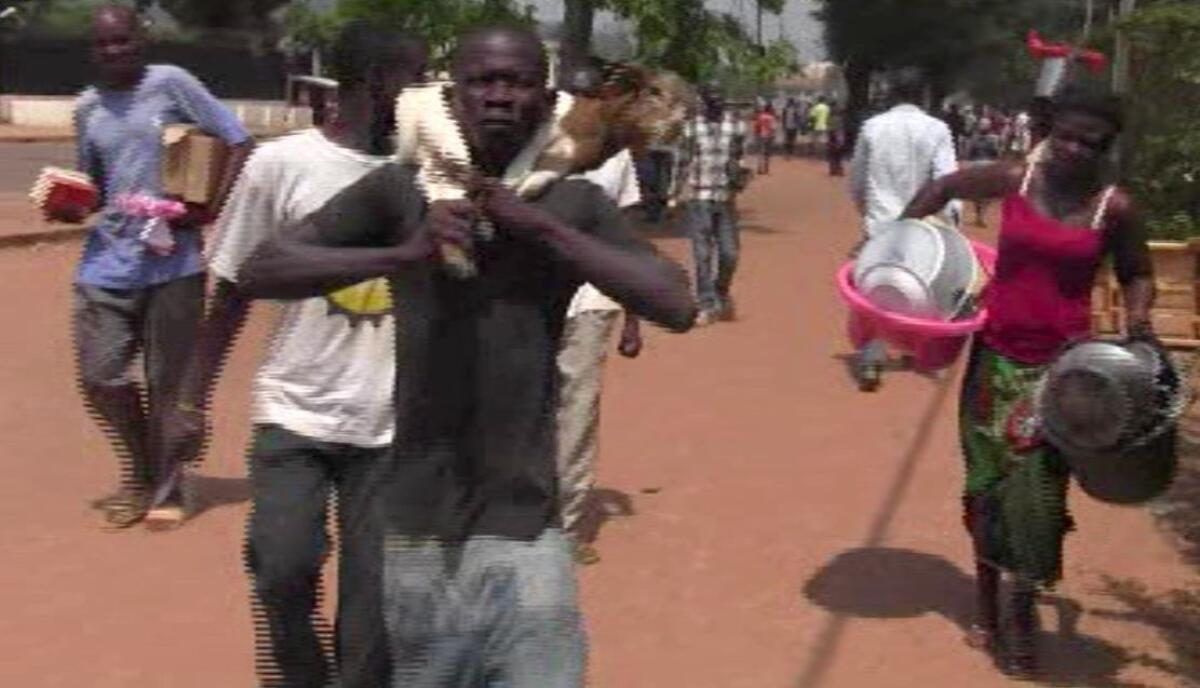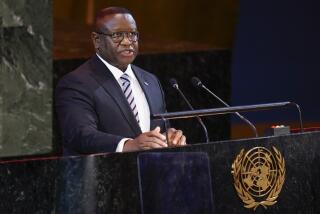African Union suspends Central African Republic after president ousted

JOHANNESBURG, South Africa -- The African Union on Monday suspended the Central African Republic and imposed sanctions after rebels ousted President Francois Bozize. South African President Jacob Zuma condemned the rebels as “bandits.”
Zuma confirmed that at least 13 South African soldiers died in a nine-hour battle after they were attacked by some 2,000 rebels, and an additional 27 South Africans were wounded. One South African soldier is missing.
“It is a sad moment for our country,” Zuma said, as controversy raged over the government’s failure to pull out its forces. “Our soldiers paid the ultimate price in the service of their country. Just over 200 of our soldiers fought bandits who wanted to cause harm, but the actions of these bandits would not deter us from our mission of peace and security.”
Zuma added that South Africa rejected any seizure of power by force.
The chair of the African Union, Nkozana Dlamini-Zuma, a senior South African official (and Jacob Zuma’s ex-wife), and U.N. Secretary General Ban-ki Moon also condemned the rebel takeover.
“The council has decided to suspend with immediate effect Central African Republic from all African Union activities and to impose sanctions, travel restrictions and an asset freeze on Seleka’s leaders,” AU peace and security chief, Ramtane Lamamra, told reporters in Ethiopia, the headquarters of the African Union.
The Seleka rebels, an alliance of different militias from the north of the country, swept into the capital on Saturday, seizing the presidential palace in fighting overnight from Saturday to Sunday. Looting, rapes, killings and human rights abuses were reported as the rebels took control.
Bozize fled the country and his whereabouts haven’t been confirmed. Seleka rebels took up arms in December, accusing Bozize of failing to keep peace agreements made from 2007 with various militias.
They suspended their advance on the capital, Bangui, signing a peace deal in January, which set up a government of national unity, but allowed Bozize to stay in office until the expiration of his term in 2016. Last week, the rebels repudiated the deal, claiming their demands hadn’t been met.
The picture grew more confused Monday, with different figures in the rebel alliance, Seleka, saying different things. One leader, Michel Djotodia, called himself the new president in an interview with Radio France International, with reports he planned to have himself sworn into office Monday.
But other Seleka leaders said they didn’t recognize him as president, the Associated Press reported.
The South African force was sent to the Central African Republic (CAR) in January as part of a peacekeeping mission to prevent rebels from taking power and to train the CAR army.
The commander of the South African National Defense Force, General Solly Shoke, ruled out withdrawing South African forces from the CAR, saying that would amount to running away.
“It’s not for me to decide whether the troops will come back home. We are soldiers. For us, running away is not an option,” Shoke said.
In an effort to placate the storm of international criticism over the ousting of Bozize, Djotodia said he would keep many members of the government of national unity, formed in January, including the prime minister, Nicolas Tiangaye, who was drawn from the opposition. He promised elections within three years, in accordance with the January peace deal.
“We will not conduct a witch hunt. I don’t know how long I will stay in power,” he said.
A rebel spokesman, Eric Massi, told RFI in Paris that there would be a few changes to the cabinet.
ALSO:
Syria opposition leader resigns
Kerry arrives for Afghanistan visit, will skip Pakistan for now
Rebels topple Central African Republic president, seize capital
More to Read
Sign up for Essential California
The most important California stories and recommendations in your inbox every morning.
You may occasionally receive promotional content from the Los Angeles Times.










